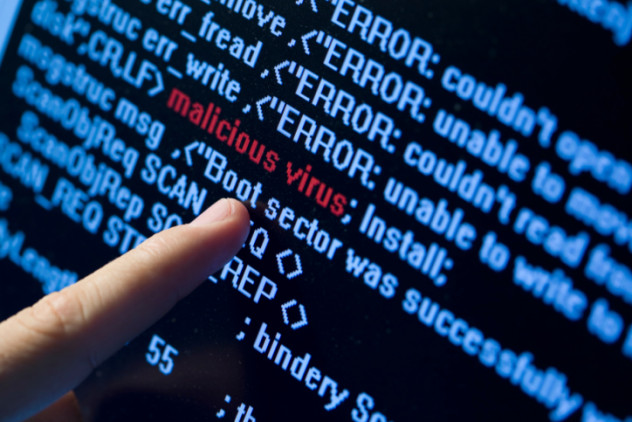(单词翻译:单击)
3.Hacking And Cracking
3.黑客入侵和破解
Anytime a website is defaced, an important account is compromised, or some group steals a bunch of login information, it's always blamed on hackers. This is the result of a misunderstanding about what hacking involves, though. Hacking is when someone who has a strong knowledge of computer security finds a vulnerability in the system and uses it to get in, usually through some kind of backdoor method.
任何时候,一个网站被损坏,一个重要的账户受到威胁,或一些团伙盗窃了大量登录信息,人们总是归咎于黑客,这是不了解黑客入侵究竟是什么的结果。黑客入侵的意思是,一些人对电脑系统安全知识非常了解,能从系统中找到漏洞,利用它入侵,通常通过某种不正当的方式进行。

Cracking, on the other hand, involves using a program written by somebody else that sort of breaks the virtual door down, often by trying different combinations of passwords over and over. These are known as "brute force" attacks. To make things more confusing, the media often refers to things as "hacking" when nothing was hacked or cracked in any way.
另一方面,破解电脑就是使用一些人写的程序来打破电脑的虚拟门,通常是尝试组合不同的密码,这就叫"暴力破解"。为了使事情显得更复杂,媒体在任何情况下都将事情说成"黑客入侵"。
2.Viruses And Spyware
2.病毒和间谍软件

Viruses are one form of malicious program, but there are many others with different names and methods of distribution. Some are entirely different groups like Spyware and Adware, which are designed to steal your information or annoy you with spam. Some malicious programs are designed so that you will never even know they are there—they hide from your anti-virus software and wait to use your computer, not affecting its functioning in any noticeable way.
病毒是恶意程序的一种形式,它有很多不同的名字和传播的方式。像间谍软件和广告软件这种完全不同的团体,它们主要是窃取信息,或用垃圾邮件进行骚扰。一些恶意程序你永远不知道它的存在,因为它们隐藏在杀毒软件中等你使用,却不会明显的影响它的功能。
While the various programs you use for security may be helpful in dealing with this, to be forewarned is to be forearmed. You'll have a better chance at dealing with malware if you know what you are up against. Protecting yourself isn't as easy as keeping your anti-virus up to date, either. Oftentimes, the anti-virus companies themselves aren't up to date on the latest malware threats, and people with evil intentions are constantly looking for ways to get around your security.
也许为保护安全性所使用的多数程序是有用的,因为事先得到警告就会事先做好准备。如果知道你要面临什么问题,你就会有更好的机会来处理这些恶意软件。保护自己的隐私不像升级杀毒软件一样简单。通常,杀毒软件公司自身也没有更新恶意软件的威胁,然而,有不良意图的人在不断寻找方法避开你的安全保护。
1.Malware From Email
1.电子邮件中的钓鱼软件

Warnings about awful viruses waiting in your inbox have been circulating since the advent of malware, but oftentimes, the warnings are false alarms. This has fueled all kinds of ludicrous practices, such as deleting suspicious emails unread due to the belief that even opening such a message can lead to viral infection. While it is certainly true that you should never open an email attachment from an untrusted source, you cannot get a virus simply from reading an email.
因为恶意软件的出现,邮件中出现病毒的警告一直流传着,但是这些警告通常是假的。所以就出现了各种奇怪的做法,比如,相信打开这些邮件会遭到病毒感染,所以删除未读的可疑邮件。的确,你永远不打开来自不受信任来源的电子邮件附件,就不会轻易的从邮件中感染到病毒。
However, there are other situations where getting a virus or other form of malware can be much easier than you might imagine. Simply by visiting a shady site, for example, you may fall victim to a drive-by download. If you're lucky, you will receive a pop-up message or other warning, but many drive-bys won't warn you of their presence before they install hidden malware. This is why it is a good idea to scan your system regularly, just in case.
然而,相比感染病毒或其他形式的恶意软件,还有其他情况比你想象得更容易感染病毒。比如只要访问一个可疑网站,因为强迫下载你就可能成为受害者。如果幸运的话,会收到弹出的消息或另一个警告,但是很多下载在安装隐藏的恶意软件之前是不会提醒的。这就是为什么定期扫描你的系统是一个好办法,仅仅是为了以防万一。
翻译:文思捷 来源:前十网


